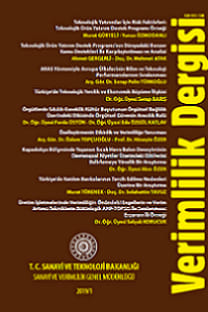GENİŞLETİLMİŞ AVRUPA ÜLKELERİNDE ENERJİ VERİMLİLİĞİ, ENERJİ BAĞIMLILIĞI VE EKONOMİK BÜYÜME
Ekonomik Büyüme, Enerji, Panel Tahmin, Enerji Verimliliği, Yapısal Kırılmalar
ENERGY PRODUCTIVITY, ENERGY DEPENDENCE AND ECONOMIC GROWTH IN EXTENDED EUROPE
Economic Growth, Energy, Panel Estimations, Energy Productivity, Structural Breaks,
___
- Al-Iriani, M.A. (2006). “Energy-GDP Relationship Revisited: An Example from GCC Countries Using Panel Causality”, Energy Policy, 34(17), 3342-3350.
- Apergis, N. and Payne, J.E. (2009). “Energy Consumption and Economic Growth in Central America: Evidence from a Panel Cointegration and Error Correction Model”, Energy Economics, 31(2), 211-216.
- Bai, J. and Perron, P. (2003). “Computation and Analysis of Multiple Structural Change Models”, Journal of Applied Econometrics, 18, 1-22.
- Benhabib, J. and Spiegel, M. (1994). “The Role of Human Capital in Economic Development Evidence from Aggregate Cross Country Data”, Journal of Monetary Economics, 34(2), 143-173,
- Boyd, G. and Pang, J.X. (2000). “Estimating the Linkage between Energy Efficiency and Productivity”, Energy Policy, 28(5), 289-296.
- Breitung, J. (2000). “The Local Power of Some Unit Root Tests for Panel Data”, Advances in Econometrics, 15, 161-177.
- Chen, J. and Galbraith, J.K. (2011). “Institutional Structures and Policies in an Environment of Increasingly Scarce and Expensive Resources: A Fixed Cost Perspective”, Journal of Economic Issues, 45(2), 301-308.
- Choi, I. (2001). “Unit root tests for panel data”, Journal of International Money and Finance, 20, 249-272.
- Damette, O. and Seghir, M. (2013). “Energy as a Driver of Growth In Oil Exporting Countries?”, Energy Economics, 37, 193-199.
- European Commission (2019). “Energy Prices and Costs in Europe (No. COM/2019/1final)”, Energy Union, https://eur-lex.europa.eu/legal-content/EN/ALL/?uri=CELEX:52019DC0001, (Accessed Date: 01 April 2019).
- EUROSTAT (n.d.). “Database”, http://ec.europa.eu/eurostat/data/database, (Accessed Date: 01 April 2019). Granger, C.W.J. (1969). “Investigating Causal Relations by Econometric Models and Cross-Spectral Methods”, Econometrica, 37, 424-438.
- Hadri, K. (2000). “Testing for stationarity in heterogenous panel data”, Econometrics Journal, 3(2), 148-16.
- Hansen, E.B. (1992). “Tests for Parameter Instability in Regressions with I(1) Process,” Journal of Business and Economic Statistics, 10 (3), 321-335.
- Huang, B-N., Hwang, M.J., And Yang, C.W. (2008). “Causal Relationship between Energy Consumption and GDP Growth Revisited: A Dynamic Panel Data Approach”, Ecological Economics, 67(1), 41-54.
- IEA (2019). "World Energy Statistics", IEA World Energy Statistics and Balances, https://doi.org/10.1787/data-00510-en, (Accessed Date: 06 April 2019).
- Im, K-S., Lee, J., Tieslau, M. (2005).” Panel LM Unit-root Tests with Level Shifts”, Oxford Bulletin of Econometrics and Statistics, 67 (3), 393-419.
- Im, K-S., Pesaran, M.H., Shin, Y. S. (2003). “Testing For Unit Root in Heterogenous Panels”, Journal of Econometrics, 115 (1), 53-74
- Jaffe, A.B., Newell, R.G., and Stavins R.N. (2004). “Economics of Energy Efficiency.” Encyclopedia of Energy, (Editors: Cutler J. Cleveland), Elsevier, Amsterdam.
- Jalil, A. (2014). “Energy–Growth Conundrum in Energy Exporting and Importing Countries: Evidence from Heterogeneous Panel Methods Robust to Cross-Sectional Dependence”, Energy Economics, 44, 314-324.
- Judson, R.A., Schmalensee, R. and Stoker, T.M. (1999). “Economic Development and the Structure of the Demand for Commercial Energy.” Energy Journal 20 (2): 29–57.
- Ketenci, N. (2013). “The Feldstein-Horioka Puzzle in Groupings of OECD Members: A panel Approach”, Research in Economics, 67, 76-87.
- Krugman, P. (1979). “A Model of Innovation, Technology Transfer, and the World Distribution of Income”, The Journal of Political Economy, 87(2), 253-266.
- Lee, C.C. (2005). “Energy Consumption and GDP in Developing Countries: A Cointegrated Panel Analysis”, Energy Economics, 27,415 – 427.
- Lee, C.C. and Chang, C.P. (2005) “Structural Breaks, Energy Consumption, and Economic Growth Revisited: Evidence from Taiwan”, Energy Economics, 27(6), 857-872.
- Lee, J., and Strazicich, M.C. (2003). “Minimum Lagrange Multiplier Unit Root Test with Two Structural Breaks”, The Review of Economics and Statistics, 85(4), 1082-1089.
- Levin, A., Lin, C.F. and Chu, C.S.J. (2002). “Unit Root Tests in Panel Data: Asymptotic and Finite Sample Properties”, Journal of Econometrics, 108(1),1-24.
- Maddala, G.S. and Wu S. (1999). “A Comparative Study of Unit Root Tests with Panel Data and A New Simple Test”, Oxford Bulletin of Economics and Statistics, Special Issue (1999) 0305-9049.
- Mehrara, M. (2007). “Energy Consumption and Economic Growth: The Case of Oil Exporting Countries”, Energy Policy, 35(5), 2939–2945.
- Narayan, P. K. and Smyth, R. (2008). “Energy Consumption and Real GDP In G7 Countries: New Evidence from Panel Cointegration with Structural Breaks”, Energy Economics, 30(5), 2331-2341.
- Ozturk, I. (2010). “A Literature Survey on Energy-Growth Nexus”, Energy Policy, 38(1), 340-349
- Phillips, P. and Hansen, B. (1990). “Statistical Inference in Instrumental Variables Regression with I(1) Processes”, Review of Economic Studies, 57(1), 99-125.
- Soytas, U. and Sari, R. (2003). “Energy Consumption and GDP: Causality Relationship in G-7 Countries and Emerging Markets”, Energy Economics, 25, 33-37.
- The World Bank (2019). “World Development Indicators”, https://Databank.Worldbank.Org/Reports.Aspx?Source=World-Development-Indicators, (Accessed Date: 01 April 2019).
- Wan J.A., Baylis K. B. And Mulder, P.C. (2015). “Trade-Facilitated Technology Spillovers in Energy Productivity Convergence Processes Across EU Countries”, Energy Economics, 48, 253-364.
- Westerlund, J. (2006). “Testing for Panel Cointegration with Multiple Structural Breaks”, Oxford Bulletin of Economics & Statistics, 68(1) 101-132.
- Zhang, X.P., Cheng, X-M., Yuan, J-H. and Gao, X-J. (2011).” Total-Factor Energy Efficiency in Developing Countries”, Energy Policy, 39(2), 644-650.
- ISSN: 1013-1388
- Başlangıç: 2004
- Yayıncı: T.C. SANAYİ VE TEKNOLOJİ BAKANLIĞI STRATEJİK ARAŞTIRMALAR VE VERİMLİLİK GENEL MÜDÜRLÜĞÜ
SAĞLIK HİZMET BÖLGELERİNİN PERFORMANSININ VERİ ZARFLAMA ANALİZİ İLE DEĞERLENDİRİLMESİ
Fatih DURUR, Meliha Meliş GÜNALTAY, Ferda IŞIKÇELİK
SÜREÇ ESNEKLİĞİ SİSTEMLERİNDE OPERASYONEL MALİYETLERE DAYALI SİSTEM TASARIMI OPTİMİZASYONU
Merve İBİŞ, Mustafa ÇİMEN, Mehmet SOYSAL
TÜRKİYE’DE BANKACILIK SEKTÖRÜ KREDİLERİNİN NET KOBİ OLUŞUMUNA ETKİSİ
Yasemin ALICIOĞLU, Güray KÜÇÜKKOCAOĞLU
TÜRKİYE LİMANLARINDAKİ KONTEYNER VE YÜK ELLEÇLEME HACİMLERİNİN YSA NARX MODELİ İLE ÖNGÖRÜLMESİ
Gamze KILINÇ, Meltem KARAATLI, Nuri ÖMÜRBEK
GENİŞLETİLMİŞ AVRUPA ÜLKELERİNDE ENERJİ VERİMLİLİĞİ, ENERJİ BAĞIMLILIĞI VE EKONOMİK BÜYÜME
Natalya KETENCİ, Ayşe SEVENCAN
REKABETÇİ TESİS YER SEÇİMİ PROBLEMLERİNE İLİŞKİN BİR TARAMA ÇALIŞMASI
Büşra OLGUN, Çağrı KOÇ, Fulya ALTIPARMAK
TÜRKİYE’DE FAALİYET GÖSTEREN BİREYSEL EMEKLİLİK ŞİRKETLERİNİN ETKİNLİĞİ
Zeynep KÜÇÜKKIRALI, Üzeyir AYDIN
WEB OF SCIENCE SÜZGECİNDEN YALIN ÜRETİM ARAŞTIRMA PORTFÖYÜ: NEREDEN BAŞLAMALIYIZ?
